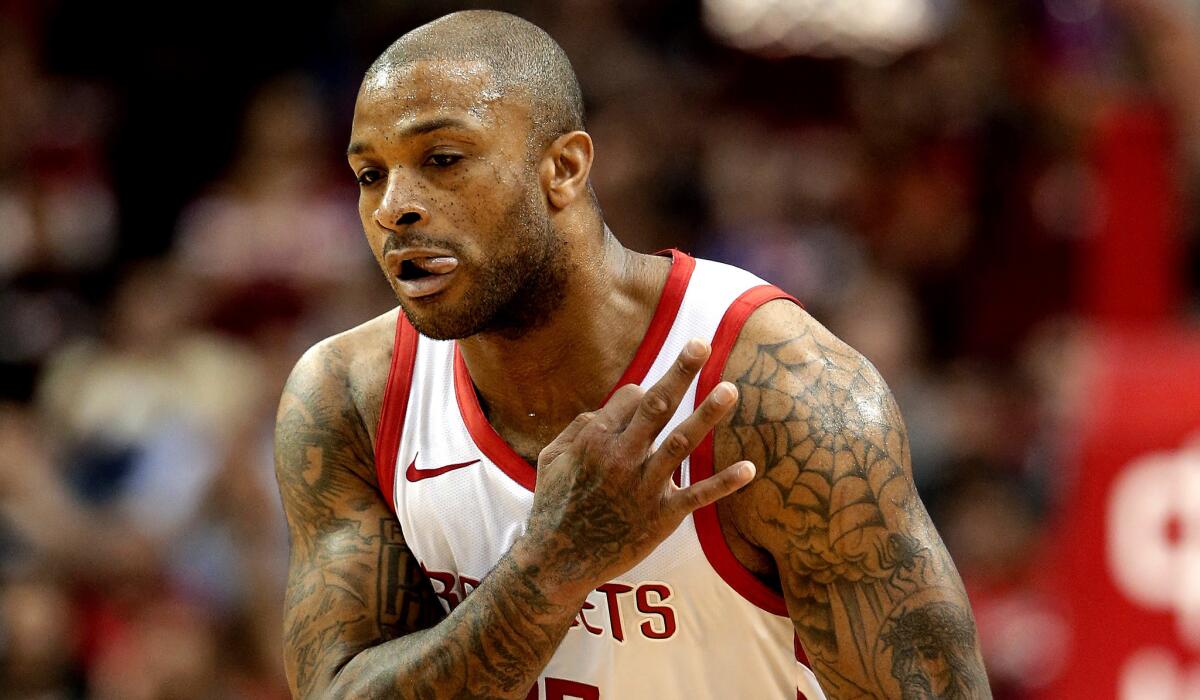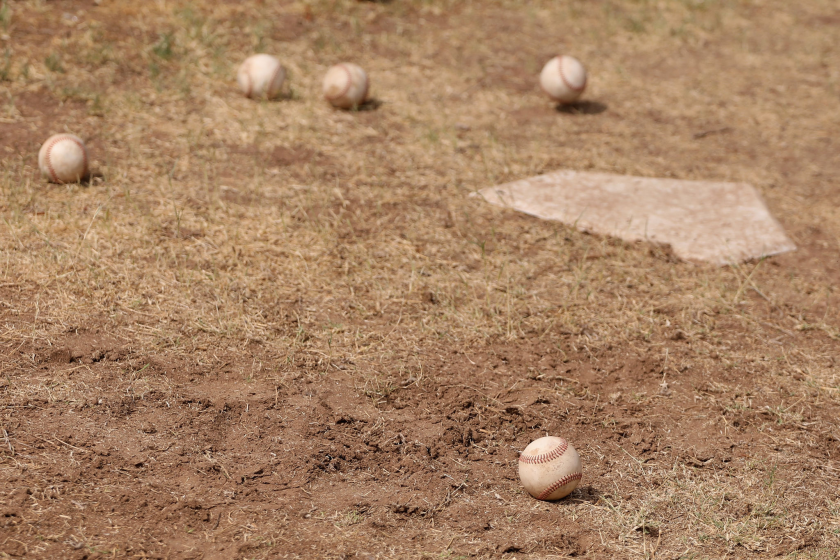Rockets’ P.J. Tucker: ‘I wasn’t coming back to the NBA; I had no interest in it,’ and what changed his mind

- Share via
Reporting from Houston — Wait. Relax. Be patient.
That last word is one Houston Rockets veteran P.J. Tucker thinks about from time to time.
On offense, he’ll often run to the corner of the court and wait. While James Harden dribbles, and dribbles and dribbles and dribbles and dribbles, working down the shot clock to find the best point of attack, Tucker stands, ready to shoot.
It’s his favorite spot on that end of the floor, where he’s become one of the NBA’s sharpest shooters. Nobody in this pace-and-space league shoots more corner three-pointers than Tucker, 3.7 per game, and he is the only player who makes at least one per game from the right side.
Finding his own little hardwood haven was no fastbreak.
“Patience — that’s crazy. I like that word,” Tucker told the Times. “I talk about it so much because it’s not something people really think about as far as being a NBA player, making it to the NBA. It’s something that everyone hates. No one wants to be patient. No one wants to wait for anything. They want it right now — that instant gratification.
“And me, I’ve really had to be patient.”
Before Tucker could be the Rockets’ corner-spacing, one-though-five-switching starting forward, he traveled to different corners of the basketball world. He will turn 34 in May, the same age as LeBron James, but is playing just his eighth season in the NBA.
Sign up for our daily sports newsletter »
Toronto selected Tucker with the fifth pick in the second round of the 2006 draft, but he couldn’t get consistent court time. He spent most of the season with the Colorado 14ers, then a team in the development league, and was waived by the Raptors before completing his rookie season.
That launched a journey across the world.
He starred in Israel and then in the Ukraine, and then back in Israel. He played well in Greece, Italy and Germany. He won most valuable player awards and championship trophies.
“I wasn’t coming back to the NBA. I had no interest in it,” Tucker said. “I was successful there. … I had established myself to the point where I was one of the best players in Europe at the time. These were million-dollar contracts.”
Americans becoming stars overseas is nothing new. Rockets coach Mike D’Antoni became a legendary point guard in the Italian leagues after a quick trip through the NBA and ABA in the mid-70’s and loved the experience.
“It rounds you out as an individual and makes you a better person,” D’Antoni said. “But future-wise, you worry about, ‘Will I ever get back to the NBA or do I stick with it? Do I go get a job?’ I think it builds and reveals character. The guys that stick out, they get better.”
Tucker was content sticking it out abroad, cementing his legacy in Europe while earning a robust paycheck. But in 2012, Phoenix’s general manager at the time, Lance Blanks, Tucker’s friend and fellow Texas Longhorn, invited him to come play for the Suns’ summer league team.
He wasn’t really interested.
Conversations with his wife, who pushed him to take one last crack at the NBA, and his agent, who saw a good fit with the Suns, persuaded him to leave the safety and stardom of Europe for the uncertainty of the NBA.
“And, it turned out to be one of the best decisions I’d ever made,” Tucker said.
In the seven seasons since returning to the NBA, Tucker has benefited from the evolution of basketball strategy. His 6-foot-6, 245-pound frame and skill set screamed “tweener” for years. With less emphasis now on positions and a greater desire for defensive versatility and shooting — particularly from the corners — Tucker was in high demand.
While Tucker was in Phoenix, the Clippers repeatedly tried to deal for him. The Raptors ended up striking a deal to get him for a playoff push in 2017. Houston rewarded Tucker that summer with a big NBA payday; he’s in the second year of a four-year, $32-million contract.
“Everything that was good about me now, was bad about me then,” Tucker said.
Added D’Antoni: “He’s really important now. He might’ve been a role player before but now he’s a major player.”
Tucker’s spacing creates driving lanes for Harden and Chris Paul. Tucker guards whoever needs shutting down almost regardless of size or position. He plays with toughness and grit that have made him a key part of the Rockets’ success under D’Antoni — success beyond the 8.2 points and 6.2 rebounds Tucker averages.
“He is what this league has become,” one Eastern Conference scout said.
With Houston center Clint Capela out until at least after the All-Star break while recovering from surgery on his right thumb, Tucker knows what’s ahead of him. He’ll have to fight with Joel Embiid, Nikola Vucevic, Anthony Davis, Nikola Jokic, Rudy Gobert, Deandre Ayton, Steven Adams, Karl-Anthony Towns and the rest of the big men coming up on Houston’s schedule.
“During the season, I’m sore everywhere. That’s all it is,” Tucker said. “But see, I’m built for this.”
Unlike a lot of his peers that underwent growth spurts during their teens, spurts that allowed them to learn guard skills before growing into NBA bodies, Tucker was always huge.
“I was a forward, a center my whole life. I’ve been the same size since I was 12. They thought I was going to be 7 feet tall,” he said. “I never grew another inch.”
The big-man instincts are going to pay off now. He just had to wait, to relax, to be patient.
Twitter: @DanWoikeSports
More to Read
Go beyond the scoreboard
Get the latest on L.A.'s teams in the daily Sports Report newsletter.
You may occasionally receive promotional content from the Los Angeles Times.











